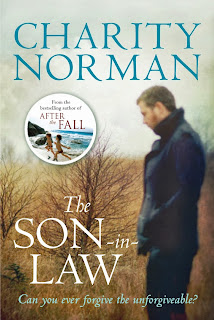The Son-In-Law by Charity Norman
The Son-In-Law is the story of three children, Scarlet, Theo and Ben, their grandparents Hannah and Freddie, and their father, Joseph. The complicating factor is that four years ago, Joseph killed the wife, mother and daughter who linked them all together. The children have been living in calm middle-class domesticity with their grandparents ever since while Joseph serves four years of his prison sentence. But now Joseph is a free man again, and is intent on rebuilding a relationship with them.
The opening chapters of The Son-In-Law read rather like a psychological thriller, with Joseph playing the role of a dangerous, disruptive presence apparently determined to reclaim his children from the stabilising influence of their loving grandparents. Joseph, after all, was unequivocally responsible for the death of Zoe, which occurred in front of all three children. But it gradually becomes clear that the situation is far more complex than it appears on the surface. A lot has been kept from us - and, in fact, from Scarlet, Theo and Ben. The Son-In-Law then becomes a relationship-focused novel about tough questions and agonising compromises.
There were times when I found The Son-In-Law's emotional rollercoaster a somewhat draining ride - not because it's a difficult read (it isn't at all) but because the story unfolds from three different points of view and we are constantly being asked to shift our sympathies from one character to another. This, however, is certainly one of the book's strengths, rather than a point against it.
What I did find to be a weakness, and which made me rather uncomfortable at times, was the portrayal of the late Zoe, who is depicted by turns as a mercurial, bewitching genius and a selfish, unstable monster as a result of her mental illness - even her maiden name, Wilde, is telling. I'm tired of people like Zoe being treated in fiction as if they are somehow 'other' rather than ordinary human beings with a mental health condition that could affect any one of us.
Of the three characters from whose perspective the story is told, Scarlet, a bright, curious teenager whose circumstances have made her mature beyond her years, emerges as the clearest and most engaging voice. Hannah, the grandmother who has brought up Scarlet and her brothers while grieving for the loss of her daughter and coming to terms with the failing health of her somewhat older husband, is by necessity a much less appealing character but certainly a convincing one and for all her faults, it's certainly hard not to empathise with her.
For me it's Joseph who seems the least well-drawn of the principal characters. For the moral questions of forgiveness and reconciliation to be addressed fully, it's hard for the author to make Joseph entirely three-dimensional: if we're to come to terms with the manner of his wife's death, it's necessary for him to be positively saintly in all other aspects of his existence, which simply doesn't ring true.
The Son-In-Law is, however, a perceptive and thought-provoking read, and its relatively light, easy style and neat resolutions don't stop it from asking uncomfortable questions of its readers.
As an aside, it appears that this book is being marketed very much as 'women's fiction.' This is a pity, as in my view The Son-In-Law would be a particularly interesting novel to read from a male perspective. A little more imagination and a little less divisive polarisation wouldn't go amiss in the world of publishing when it comes to marketing a book like this.

Comments
Post a Comment